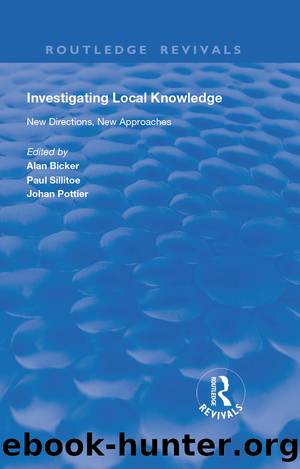Investigating Local Knowledge by Paul Sillitoe

Author:Paul Sillitoe [Sillitoe, Paul]
Language: eng
Format: epub
Tags: Science, Earth Sciences, Geography, Social Science, General, Sociology, Rural
ISBN: 9780429583148
Google: pTj3DwAAQBAJ
Publisher: Routledge
Published: 2019-05-23T04:54:52+00:00
Chapter 6
The INGO, the Project, and the Investigation of âIndigenous Knowledgeâ: The Case of Non-Timber Forest Product (NTFP)
Sebastian Taylor
In its mainstream model of socio-economic (and ultimately urban-industrial) modernity, âdevelopmentâ has, not infrequently, been indicted as the actualisation or continuation of a Western epistemological hegemony (Fowler 2000; Rist 1997; Escobar 1995; Esteva 1992). Post-modern critiques have attacked Western Enlightenment science and its assertion of an absolute, objective and singular knowledge towards the realisation of which all cultures, in the course of development, are assumed to aspire,1 asserting instead the plurality of culture, and observing a multitude of âsciencesâ, of alternative epistemologies, of âknowledgesâ â knowledges that are indigenous and concrete rather than universal and abstract. In the practical field of international âdevelopmentâ aid, that reversal of Western emphasis has been championed by the non-government sector (here, international NGOs).
Contemporary INGO discourse privileges diversity of knowledges generated indigenously within the specific geographical and cultural localities of the people whom development is intended to serve â predominantly the subsistent, rural poor.2 That emphasis on indigenous (or âlocalâ) knowledge as the true measure of, and guide for, development (ascendant during and out of the âlost decadeâ of 1980s and dominating structural adjustment aid policies) occurred alongside a sea-change in the kind of organisation deemed proper and best to enact aid. Where modernisation was explicitly state-led, developmentâs âpost-modernisingâ period, by contrast, has demanded the agency of the non-governmental.
In this shift, development discourse has increasingly evoked (albeit in varying degrees) a kind of foundational political neutrality, situating aid beyond the state in an imperative of humanitarianism (paradoxically universal and local simultaneously) and the assertion, therein, of a consensus underlying the interaction of the Western and the indigenous. Ultimately, otherwise hostile or competitive development interests and interpretations (of Western and ânon-Westernâ, state and non-state and so on), are implicitly brought into consensual alignment under the guiding hand of the local, the indigenous and its universal authenticity.
But there are significant problems â in this context â in the way âindigenous knowledgeâ informs contemporary development theory and practice. In the first place, we can ask how indigenous local knowledge and the international organisation interact. âIndigenous knowledgeâ, arguably, expresses itself predominantly in the immediate practices of the local group. The processes by which it becomes absorbed as knowledge through the far-flung offices of the international organisation involve, necessarily therefore, distanciation and abstraction â the conversion of actual practices into documentary record, the aggregation of incidences into general categories, and their transmission, in an essentially conceptual form, out of the local and upwards through the decision- and policy-making geo-hierarchy of the INGO. Indigenous knowledge as live practice is progressively refined (at the simplest level in the acronym, âIKâ) into an abstract generalisation, in the worst instance, thereby, simply replacing the idea of the bloc of Western knowledge with an opposing but equally objectified and objectifying concept of âthe localâ.
Moreover, it is arguable that âindigenous peopleâ rarely use a conscious category âindigenousâ in considering themselves and the practice of their lives;3 and we
Download
This site does not store any files on its server. We only index and link to content provided by other sites. Please contact the content providers to delete copyright contents if any and email us, we'll remove relevant links or contents immediately.
Nudge - Improving Decisions about Health, Wealth, and Happiness by Thaler Sunstein(7706)
The Fire Next Time by James Baldwin(5446)
iGen by Jean M. Twenge(5416)
Adulting by Kelly Williams Brown(4574)
The Sports Rules Book by Human Kinetics(4386)
The Hacking of the American Mind by Robert H. Lustig(4383)
The Ethical Slut by Janet W. Hardy(4253)
Captivate by Vanessa Van Edwards(3839)
Mummy Knew by Lisa James(3691)
In a Sunburned Country by Bill Bryson(3542)
The Worm at the Core by Sheldon Solomon(3487)
Ants Among Elephants by Sujatha Gidla(3467)
The 48 laws of power by Robert Greene & Joost Elffers(3291)
Suicide: A Study in Sociology by Emile Durkheim(3022)
The Slow Fix: Solve Problems, Work Smarter, and Live Better In a World Addicted to Speed by Carl Honore(3009)
The Tipping Point by Malcolm Gladwell(2922)
Humans of New York by Brandon Stanton(2873)
Get What's Yours for Medicare: Maximize Your Coverage, Minimize Your Costs by Philip Moeller(2732)
Handbook of Forensic Sociology and Psychology by Stephen J. Morewitz & Mark L. Goldstein(2705)
